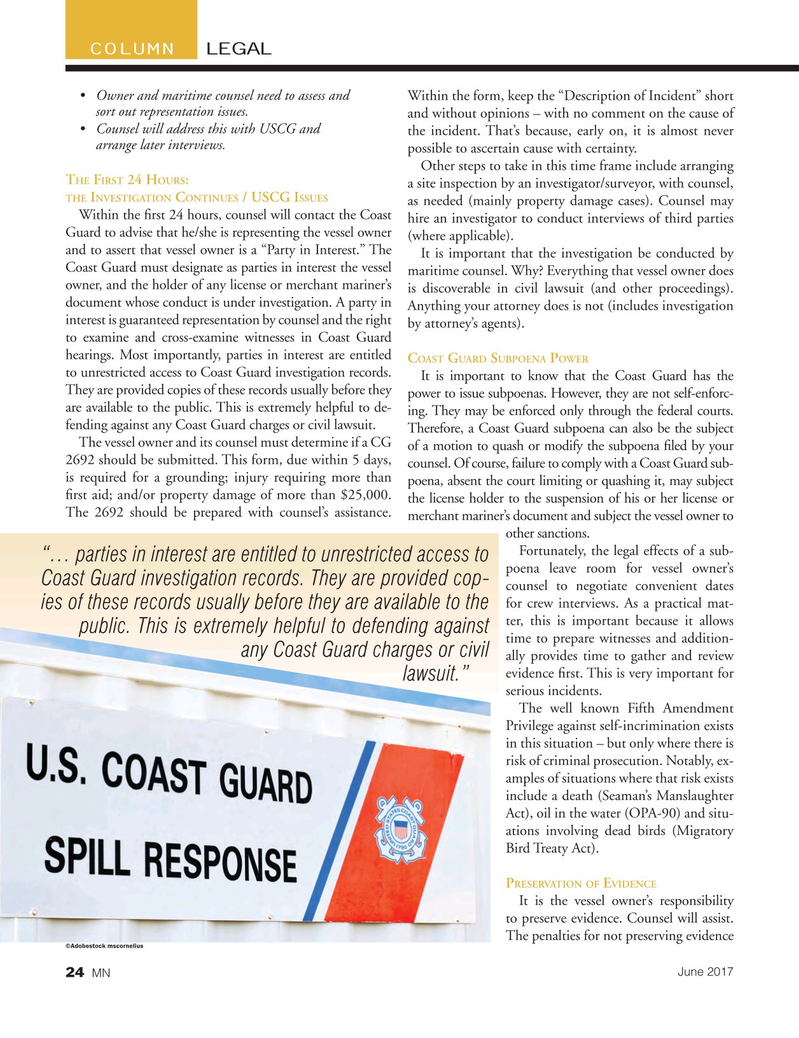
Page 24: of Marine News Magazine (June 2017)
Combat & Patrol Craft Annual
Read this page in Pdf, Flash or Html5 edition of June 2017 Marine News Magazine
COLUMN LEGAL • Owner and maritime counsel need to assess and Within the form, keep the “Description of Incident” short sort out representation issues.
and without opinions – with no comment on the cause of • Counsel will address this with USCG and the incident. That’s because, early on, it is almost never arrange later interviews.
possible to ascertain cause with certainty.
Other steps to take in this time frame include arranging
HE IRST OURS: a site inspection by an investigator/surveyor, with counsel,
T F 24 H
THE NVESTIGATION ONTINUES SSUES I C / USCG I as needed (mainly property damage cases). Counsel may
Within the ? rst 24 hours, counsel will contact the Coast hire an investigator to conduct interviews of third parties
Guard to advise that he/she is representing the vessel owner (where applicable).
and to assert that vessel owner is a “Party in Interest.” The
It is important that the investigation be conducted by
Coast Guard must designate as parties in interest the vessel maritime counsel. Why? Everything that vessel owner does owner, and the holder of any license or merchant mariner’s is discoverable in civil lawsuit (and other proceedings). document whose conduct is under investigation. A party in Anything your attorney does is not (includes investigation interest is guaranteed representation by counsel and the right by attorney’s agents). to examine and cross-examine witnesses in Coast Guard hearings. Most importantly, parties in interest are entitled C G S P
OAST UARD UBPOENA OWER to unrestricted access to Coast Guard investigation records.
It is important to know that the Coast Guard has the
They are provided copies of these records usually before they power to issue subpoenas. However, they are not self-enforc- are available to the public. This is extremely helpful to de- ing. They may be enforced only through the federal courts. fending against any Coast Guard charges or civil lawsuit.
Therefore, a Coast Guard subpoena can also be the subject
The vessel owner and its counsel must determine if a CG of a motion to quash or modify the subpoena ? led by your 2692 should be submitted. This form, due within 5 days, counsel. Of course, failure to comply with a Coast Guard sub- is required for a grounding; injury requiring more than poena, absent the court limiting or quashing it, may subject ? rst aid; and/or property damage of more than $25,000. the license holder to the suspension of his or her license or
The 2692 should be prepared with counsel’s assistance. merchant mariner’s document and subject the vessel owner to other sanctions.
Fortunately, the legal effects of a sub- “… parties in interest are entitled to unrestricted access to poena leave room for vessel owner’s
Coast Guard investigation records. They are provided cop- counsel to negotiate convenient dates for crew interviews. As a practical mat- ies of these records usually before they are available to the ter, this is important because it allows public. This is extremely helpful to defending against time to prepare witnesses and addition- any Coast Guard charges or civil ally provides time to gather and review evidence ? rst. This is very important for lawsuit.” serious incidents.
The well known Fifth Amendment
Privilege against self-incrimination exists in this situation – but only where there is risk of criminal prosecution. Notably, ex- amples of situations where that risk exists include a death (Seaman’s Manslaughter
Act), oil in the water (OPA-90) and situ- ations involving dead birds (Migratory
Bird Treaty Act).
RESERVATION OF VIDENCE
P E
It is the vessel owner’s responsibility to preserve evidence. Counsel will assist.
The penalties for not preserving evidence ©Adobestock mscornelius
June 2017
MN 24

 23
23

 25
25
